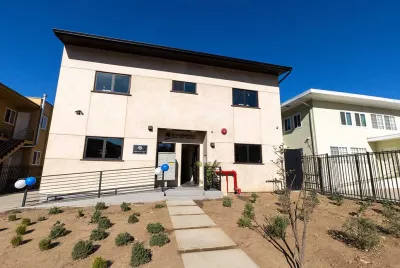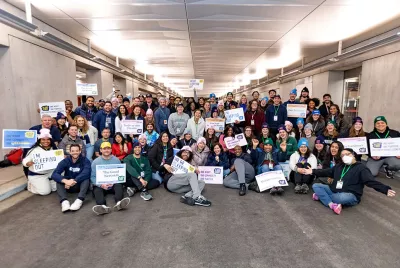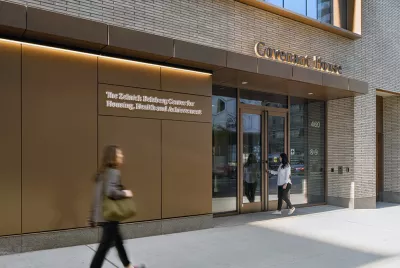Covenant House Signs Amicus Brief in Support of the Rights of the Homeless in Landmark Supreme Court Case
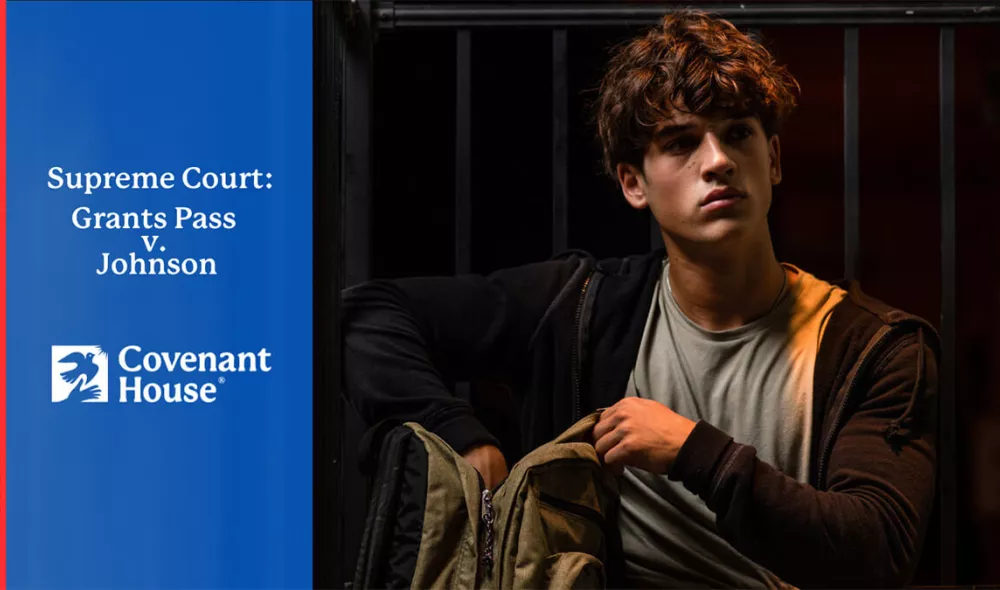
Covenant House Joins Law Enforcement Associations, Faith-Based Organizations, Medical Professionals, Legal Experts, Academic Leaders, Advocates, and Members of Congress to Urge an End to the Criminalization of Homelessness
NEW YORK, NY April 3, 2024 — Covenant House proudly announced that it has signed onto an amicus brief submitted today in support of the plaintiffs in the upcoming landmark U.S. Supreme Court case Johnson v. Grants Pass.
Johnson v. Grants Pass is the most important case regarding homelessness in the past 40 years. It will address the critical issue of whether laws punishing homeless individuals for sleeping outdoors with basic protections such as a pillow or blanket — when no safe and accessible shelter options are available — are violations of the Eighth Amendment of the U.S. Constitution, which protects against excessive bail, fines, and cruel and unusual punishment.
Covenant House International, along with Covenant House Alaska, Covenant House California, Covenant House Florida, Covenant House Michigan, Covenant House New Jersey, Covenant House New York, and Covenant House Texas have signed an amicus brief of Juvenile Law Center, Lambda Legal Defense and Education Fund, and 223 experts in solidarity with the rights of unhoused youth across the U.S. They are joined by the National Homelessness Law Center (NHLC) and a broad array of hundreds of organizations and public leaders who have submitted a total of 42 amicus briefs on behalf of the plaintiffs.
An amicus brief is a legal document submitted to a court of law by persons or organizations with expertise in the field addressed by a particular legal case before the court. With over 50 years serving young people facing homelessness, Covenant House is a subject matter expert in how laws, policies, and other systems impact young people facing homelessness in both the immediate and longer term and a leader in building viable solutions to the youth homelessness crisis.
“Criminalizing young people facing homelessness is not a solution to the youth homelessness crisis,” said Ginger Pryor, Covenant House chief strategy officer. “We need to change the laws, policies, conditions, and practices that lead young people to experience homelessness in the first place and address our country’s housing shortage by providing more, diverse, and affordable-for-youth housing options. These measures are part of Covenant House’s comprehensive, collaborative vision for ending youth homelessness as we know it, a vision we’re confident will have a multigenerational effect.”
“This case challenges us to face the reality that using things like jails and fines do nothing to solve homelessness and actually make homelessness worse,” said Jesse Rabinowitz, campaign and communications director for NHLC. “Punishing our neighbors who have no choice but to sleep outside pushes them further into poverty and makes it harder to secure work and housing. The overwhelming support from a diverse array of organizations that we see in these amicus briefs underscores the need for our elected officials at every level of government to solve homelessness with housing and support, not make homelessness worse by using jail cells and bulldozers.”
Currently, more than 600,000 people in America experience homelessness on any given night, with nearly half — 250,000 — sleeping outside. Data from the U.S. Department of Housing and Urban Development shows a rise in homelessness for both sheltered and unsheltered individuals in nearly every state. In HUD’s 2023 Annual Homeless Assessment, it is reported that nearly four in ten unaccompanied youth experiencing homelessness were unsheltered. On a single night, more than 34,700 unaccompanied people under the age of 25 experienced homelessness on their own as “youth.” This number increased by 15% year over year. Another 7,184 youth were experiencing homelessness as parents, with at least one child under the age of 18, a 12% increase from the previous year. In total, there were more than 55,000 unaccompanied youth or parenting youth and their children experiencing homelessness on a given night last year.
The primary cause of the record levels of homelessness we see today is the unaffordable housing market, according to research from the Harvard Joint Center for Housing Studies.
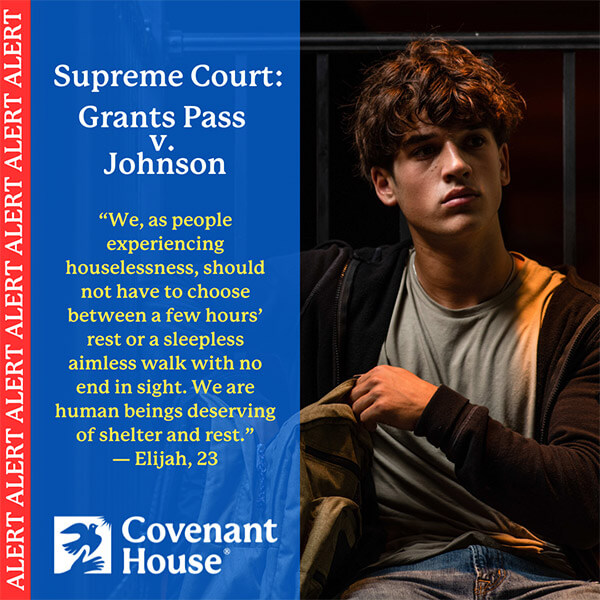
To put it plainly, in the words of Covenant House alum Derrick, "Rent is very, very high. It’s so easy to fall back into that same situation we came out of. Before I moved to [Covenant House’s] Linden Commons, I was paying $700 for a single room, sharing everything with everybody I lived with. I hadn’t found my own apartment yet because of rent being so high, no matter how much I saved up.” Homelessness can be non-recurring when youth have access to housing they can afford, and the opportunity to build a new life. Criminalization is not a solution, but a catastrophic difficulty to add to the lives of young people like Derrick.
Below is an excerpt from the amicus brief signed by Covenant House:
“Alleviating youth homelessness requires making permanent, affordable housing available to young people. It also requires local municipalities to provide services and resources that address youth needs, including support for families struggling with addiction, safe living situations for young people experiencing abuse, supports for young people seeking employment and self-sufficiency, and opportunities for young people who have been court-involved. (Annie E. Casey Found., Preventing and Ending Youth Homelessness in America 4-5 2023). Criminalization, in contrast, undermines youth trust in adults and therefore creates barriers, rather than opportunities, to stable housing for youth. These barriers create a pipeline from youth to adult homelessness.”
ABOUT COVENANT HOUSE
Covenant House builds a bridge to hope for young people facing homelessness and survivors of human trafficking through unconditional love, absolute respect, and relentless support. Our doors are open 24/7 in 34 cities across the United States, Canada, Guatemala, Honduras, and Mexico. Our array of programs ranges from public education and prevention to intervention to restoration or aftercare. Besides food, shelter, and clothing, they include outreach, medical and mental health care, education, workforce development and job placement, substance use treatment, civil legal aid services, support for young families, transitional and supportive apartment-living, and life skills training. Covenant House's doors are open to all young people who need housing and help, regardless of their race, religion, sexual orientation, or gender identity or expression, and our services and programs are available at no cost. Our North Star is ending youth homelessness as we know it. covenanthouse.org
ABOUT THE NATIONAL HOMELESSNESS LAW CENTER
The National Homelessness Law Center (NHLC) is at the forefront of the fight against homelessness in America. Their mission is to fearlessly advance federal, state, and local policies to prevent and end homelessness while fiercely defending the rights of all unhoused persons. They work to shape and advance policies at the federal, state, and local levels aimed at preventing and ultimately ending homelessness. By fostering partnerships, influencing policy, and mobilizing communities, the NHLC is dedicated to transforming how society addresses homelessness, striving for a future where everyone has a place to call home. Learn more at homelesslaw.org.
You might also like...
Shelter Is Only the Beginning
From crisis to care: Find out what it's like when a young person enters our doors.
